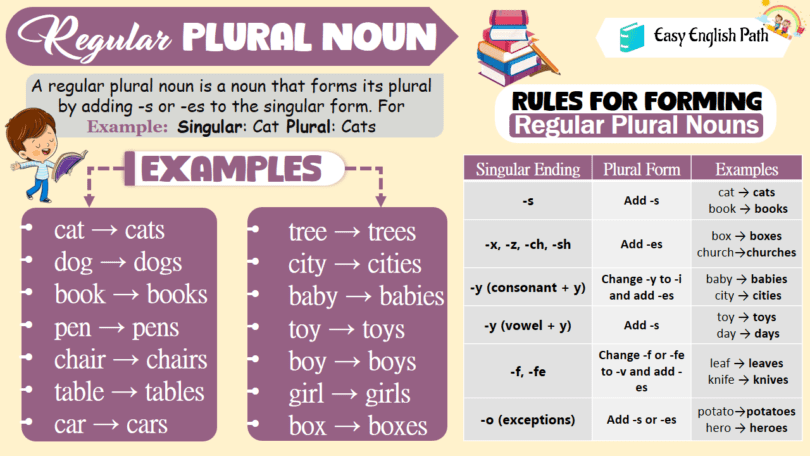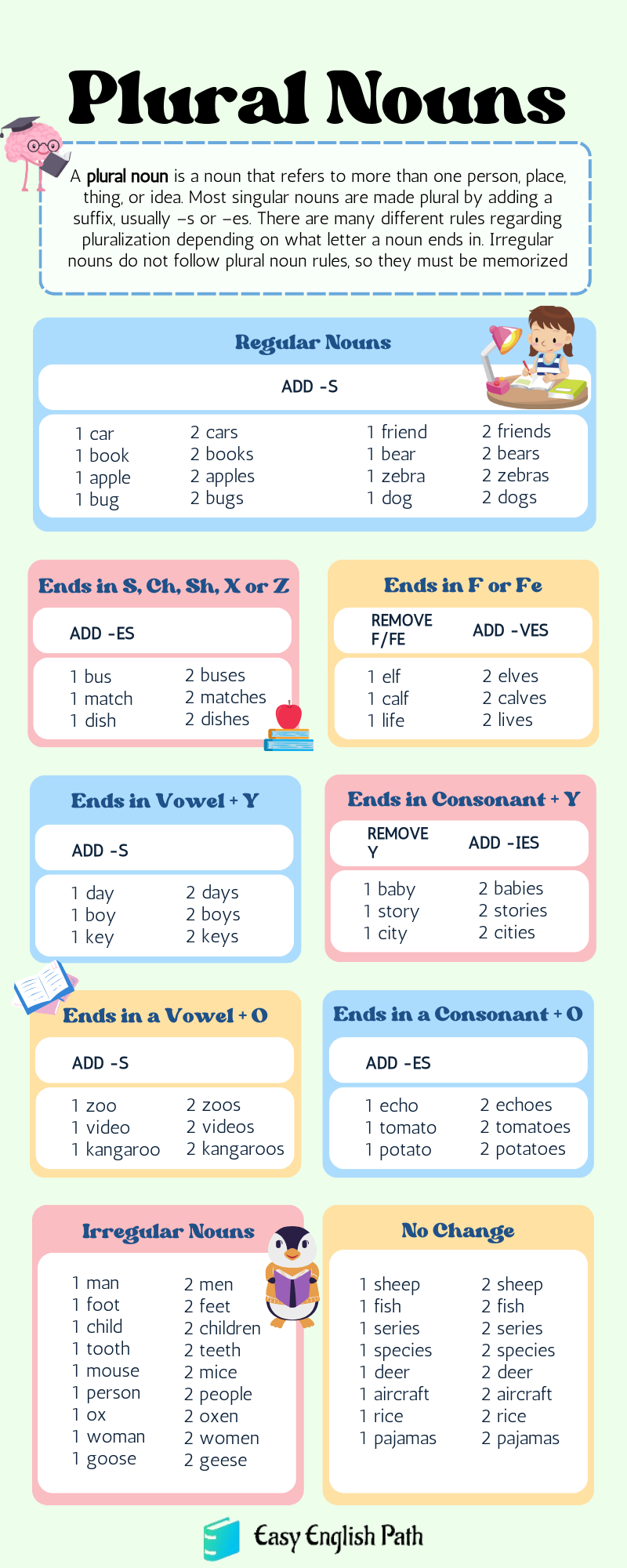Regular plural nouns are words that are used to talk about more than one thing. To make them plural, we usually just add “s” or “es” to the word. Regular plural nouns Examples include, one cat becoming many cats, and one dog becoming many dogs. Knowing how to make words plural helps us talk about many things easily. It’s like a rule we follow to make our words sound right when we talk or write. So, when we have one toy, we say toys when there are many. Learning about regular plural nouns makes talking and writing in English a bit simpler!
What are Regular Plural Nouns?
Regular plural nouns are nouns that form their plural by adding a suffix to the singular form of the word. In English, the most common way to create regular plural nouns is by adding the suffix “-s” or “-es” to the singular form. The choice between “-s” and “-es” depends on the spelling of the singular noun.
Examples:
- The dogs barked loudly in the park.
- She owns three beautiful houses in the neighborhood.
- Our library has a wide variety of books for all ages.
- I saw two colorful butterflies in the garden.
Rules for Formation of Regular Plural Nouns:
- Add “-s” to the singular noun
- Add “-es” to the singular noun if it ends in s, x, z, ch, or sh
- Change “-y” to “-ies” if the singular noun ends in a consonant + y
- For nouns ending in “o,” add “-es” unless preceded by a vowel
- Nouns ending in “-f” or “-we” usually change to “-ves”
- Some nouns have the same form in both singular and plural
- Irregular plurals must be memorized
Add “-s” to the singular noun:
In the simplest form, to create the plural of a singular noun, you add “-s” to the end. This rule applies to the majority of nouns in the English language, making it the most straightforward pluralization method.
Examples:
- cat → cats
- dog → dogs
- book → books
- car → cars
Add “-es” to the singular noun if it ends in s, x, z, ch, or sh:
When a singular noun ends in specific consonants like s, x, z, ch, or sh, adding “-es” ensures correct pluralization. This rule helps maintain proper pronunciation and avoids awkward-sounding plurals.
Examples:
- bus → buses
- box → boxes
- quiz → quizzes
- church → churches
- dish → dishes
Change “-y” to “-ies” if the singular noun ends in a consonant + y:
If a singular noun ends in a consonant followed by “y,” changing the “y” to “ies” forms the plural. This rule addresses the spelling and pronunciation challenges associated with “y” as a plural ending.
Examples:
- city → cities
- baby → babies
- party → parties
For nouns ending in “o,” add “-es” unless preceded by a vowel:
Pluralizing nouns ending in “o” involves adding “-es,” but there is an exception if the “o” is preceded by a vowel. The rule ensures consistent pluralization while considering the vowel sound that precedes the “o.”
Examples:
- potato → potatoes
- hero → heroes
- radio → radios
Nouns ending in “-f” or “-fe” usually change to “-ves”:
When a singular noun ends in “-f” or “-fe,” the plural is formed by changing it to “-ves.” This rule addresses the irregularity in the pluralization of words ending in these specific consonant combinations.
Examples:
- leaf → leaves
- knife → knives
- but, roof → roofs
Some nouns have the same form in both singular and plural:
Certain nouns, such as deer, sheep, and fish, do not follow the typical pluralization rules and have identical forms in both singular and plural. This exception contrasts with the general pattern of pluralizing nouns and needs to be memorized.
Examples:
- Deer
- Sheep
- Aircraft
- Series
- Species
- Offspring
Irregular plurals must be memorized:
Some nouns have irregular plural forms that deviate from the standard rules, requiring memorization.
Examples:
- man → men
- woman → women
- child → children
Regular Plural Noun Examples:
- I have two cats at home.
- The store sells various shoes.
- Birds are singing in the trees.
- My sister has three dogs.
- We bought new phones last week.
- The cars are parked outside.
- Kids love colorful balloons.
- I found two interesting books.
- The movie has funny jokes.
- She bought three cute puppies.
You May Also Like this






